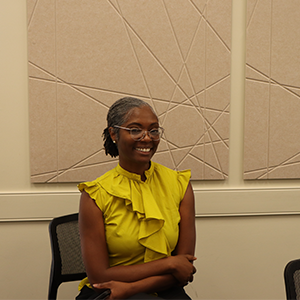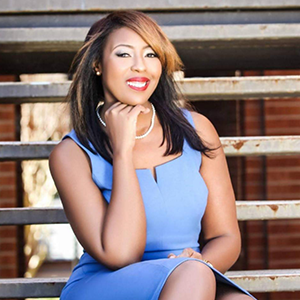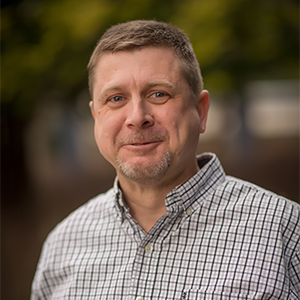by Chris Hilburn-Trenkle
Three new faculty members will soon be tasked with mentoring and overseeing future social workers at the University of North Carolina at Chapel Hill School of Social Work.
The School of Social Work welcomed back three former students — Carynne Williams, ’10 (MSW), Michelle Chambers-Rollins, ’08 (MSW), and Matt Diehl, ’02 (MSW), — as clinical assistant professors, effective May 6.
We spoke with the three professors to learn about their prior experience, what they hope to teach students, why they joined the School, and more. This transcript has been edited for clarity.
Carynne Williams

Can you tell me a little about your prior work experience?
I graduated from Winston-Salem State University undergrad and got an MPA (Master of Public Administration) from North Carolina Central University, then came to Carolina for my MSW and graduated in 2010.
Most of my experience has been in community-based mental health and providing psychotherapy services to individuals, couples and families. I have practiced in the (Federal) Bureau of Prisons as a psychotherapist for sexually dangerous persons. I’ve done a lot of policy work in terms of developing local government policy and federal policy, and while I was getting my MSW, I worked as a policy intern for former first lady (Michelle) Obama in 2010. My clinical specialties are trauma, depression and anxiety.
How do you feel your prior experience will help your ability to impart knowledge to students?
One of the things that I have learned in my prior experiences is that the needs for human beings are universal. Whether that is a homeless person living on the street or the president of the United States, we all have the same basic needs and desires and we go about meeting those needs and desires in a multitude of ways.
One of the things that I hope to impart to my students is how to balance meeting the needs of others while also making sure they engage in self-care and meet their own needs and address the universal issues that belong to all human beings.
What are some of your goals for teaching at the School?
I’m hoping in this role to be a support for students. I’m hoping to open students’ eyes to different opportunities, whether those are in direct practice and clinical work or in positions that are more macro-based or macro-focused working to develop and implement policy, working in government. (I want to expose) students to the different opportunities that there are in social work because wherever there are people, social workers belong in those areas.
I’m hoping to be able to create pathways for students to see themselves, maybe even in some non-traditional spaces for social workers to be.
Why did you decide to join the School?
It’s something that’s beyond what I could have foreseen for myself to come back into the program as a faculty member. I still remember conversations and experiences with the faculty who were here when I was here. Those interactions were pivotal in helping me to make it through my MSW program and helping me envision myself in some of the places and opportunities that I’ve had since graduating. Knowing some of the professors that I had is what has propelled me forward. Maintaining those relationships for me has been critical; now I get the opportunity to be that social support and encouragement for someone else. I am honored, so very honored, to be able to do that for students in the program, who are coming into the program right now.
What are some of your interests or hobbies?
Being active in my faith group in my church. I also have a nonprofit called MEND that is a social justice and mental health organization working to help eliminate racial trauma for Black and Indigenous people. I run that part-time. I also have a small private practice that I run locally, working mainly with students from Duke University.
Is there anything else you would like people to know about you?
I’m always interested in learning, growing and changing, and providing opportunities for others to do the same.
Michelle Chambers-Rollins

Can you tell me about your prior work experience?
I initially started in child welfare, so I was an assessment social worker. I worked in a couple of counties. I worked in a small town and then I worked in a larger county — Person and Wake County. At the time, I was working — specifically towards the end of my child welfare career — with those that had substance misuse issues. I became particularly interested in the prevention side of things as opposed to responding to child welfare allegations. So that’s what prompted me to go back to get my MSW. I wanted to work in direct practice with families and children on the intervention side as opposed to responding to the allegations.
I graduated with my MSW in 2008 and I went right into private practice, so I started working with someone else’s private practice as a therapist when I had my associate level LCSW, and then I also worked with families that had been impacted by substance misuse and provided therapy to them as well.
My career expanded from there. I stopped working in child welfare, then I transitioned to the private sector. I worked with a private agency as their clinical director for some years, supervising clinicians on the techniques and interventions that they use with families and children that they were seeing for outpatient and mental health therapy. I also developed training and policy as a part of my work as a clinical director at that agency.
Then I opened my own private group practice. I continue to have the opportunity to serve clinicians and train them on various treatment modalities as it relates to substance misuse and/or mental health issues. I see people directly and I also provide supervision.
What led me to my next step in this journey was my work with the Family and Children’s Resource Program at the School of Social Work. I worked as the child welfare education collaborative project manager. We work with students at universities across the state that specifically wanted to go into child welfare and needed to have a specialty in child welfare. I helped them to obtain that specialty in child welfare by providing training and coordinating with their university. That partnership is what led to them receiving the child welfare education collaborative certificate.
The theme for me has been being impactful and engaging in the community, that’s really important to me. Whatever experiences I have, I want to give back to the community while I continue to learn and fine-tune my skill set and I want to be able to share that with students.
How do you feel your prior experience will help your ability to impart knowledge to students?
I’ll be able to give them real-life examples. What I’ve seen is that students want to know, ‘What do I do in these various situations or these challenging situations including taking care of myself and utilizing the skill set that we’re developing.’ So, if I were to teach a motivational interviewing course or child adolescent theory in practice course, (my experience will) literally fill the gap between theory and what it looks like to have practiced led by an evidence-based theory.
When I say practice I mean being culturally considerate, inclusive, knowing how to communicate with people, understanding the community that we work with, statistically-wise who we’re working with, the population’s needs and how that applies to the work that we’re doing.
What are some of your goals for teaching at the School?
I want to model exactly what students need to do in actual practice. I want to give them the foundational pieces with theory and research about the communities they’re working with and then I want them to be able to apply that with the populations they’re working with, and that could be in various settings. I’ve worked in DSS (Division of Social Services), in the clinical setting, in supervisory roles, so I feel like I can help them bridge that macro and micro gap, too, because there may be some overlap in their jobs.
Why did you decide to join the School?
It was a full circle moment. I graduated from this program as an MSW student and then I went to work in child welfare myself and I had some really good mentors, so mentorship was really important — professors and supervisors — and that made me a really good social worker. Without them, I couldn’t be the social worker I needed to be with those families and children that I worked with and those respective populations.
Then when I got the adjunct position in the fall semester of 2023, the students were really open and receptive and wanted to learn. I got so much good feedback from them about practice experiences, how that really helped them to fine-tune their experiences. I was able to help them with their writing and research as a part of that process. I’m able to teach here, be a part of course development, and I can still have my group practice. It really means a lot.
What are some of your interests or hobbies?
I have a dog; her name is Cocoa. She’s a boxer and she’s 11. Cocoa has been with me through a lot of my career. I love to go on walks with her, I love to go walking or jogging. Mindfulness practices are really important to me, doing some reflection work and journaling. Spending time with my husband and my family is important. They’re No. 1, God then my family time. We like to eat some good food, hang out together in general.
Is there anything else you would like people to know about you?
I want to highlight that culturally competent practice is really important to me. Inclusion, awareness, understanding how people show up, how you can help them show up in the way they want to, how to help them define their identities and fine-tune that, that’s really important to me and that can apply to any population. I want to make sure that can translate to the students as well.
Matt Diehl

Can you tell me about your prior work experience?
While going to school, I worked as a research assistant and also did housing work for Urban Ministries in Raleigh, working in the shelter and working in a transitional housing program for adults with serious mental illness. Since finishing school, I’ve primarily worked providing education and employment services to adults dealing with serious mental health issues and co-occurring disorders, often substance use disorders.
(At UNC Center for Excellence in Community Mental Health) I was training, consulting and evaluating statewide an evidence-based support and employment service that was provided by almost 40 providers across the state of North Carolina called Individual Placement and Support. It’s an integrative employment intervention in the mental health treatment setting, so employment services and behavioral health services are being provided to people in conjunction — everyone is at the table working together. I trained that model and evaluated how well and effectively providers were following the model for the last 10 years.
How do you feel your prior experience will help your ability to impart knowledge to students?
I have a lot of hands-on experience providing services to this population. In addition to training the model I’ve actually provided these services myself. I helped us start a team at UNC in the Department of Psychiatry about 10 years ago as well. I have a lot of hands-on experience providing services, mostly education and employment services, in a behavioral health setting to people here and across the state. I think that will be valuable. I understand the landscape of community-based mental health.
In my training role I’ve also done a lot of work with systems. I was working with managed care organizations to help educate them about how they could better support their provider network through policy and funding mechanisms and was doing a lot of that same consultation for the state Department of Health and Human Services, where a lot of the funding comes through NC DHHS to the MCOs, especially for uninsured people. I have both macro and micro experience from my previous work history.
What are some of your goals for teaching at the School?
I am hoping that my experience will spark some interest in getting some students to consider working in community-based mental health. There’s a real issue across the state, and probably across the nation, workforce-wise. We just don’t have enough qualified people working in these settings, so I’m hoping that I’ll be able to teach students about some of these services and where they are across the state and the impact they can have and also utilize connections I have in that world to provide more ongoing, real-life experience and education to the students. I envision having people come and speak about the work that they do. I understand that won’t be a big part of the coursework, but I think I’ll be able to lean into my connections.
I want to help inform students about how policy and funding impact the work that happens out in the field, being able to relay those policy and funding challenges to what patients or people receiving services are going to get from providers. So, I want to make those connections for students.
Why did you decide to join the School?
One of the issues was, since the pandemic, seeing the real workforce challenges and issues that providers are facing, especially in community-based services. It’s not an office-based clinical setting, so providers are out there meeting people needing help in their homes, out in the communities. I think that became a lot less appealing during Covid, for obvious reasons. One of the things is I see this as an opportunity to help create opportunities for students to engage in that type of work, which I think is really valuable and important.
I’m an alum of the program, so I feel like this is also a bit of a coming home. I worked for over 20 years at the (North Carolina) Department of Health and Human Services and worked in the Department of Psychiatry at UNC, so I was a social worker working in other environments and settings and I see this as a coming home. The School’s mission and values align very well with my own. I’m excited to work in more of a teaching setting.
As a trainer and consultant for the state on the supportive employment service for the last nine-plus years, I was doing a lot of teaching. I was providing a lot of face-to-face trainings around the model to providers, so in some sense I was already doing some teaching in that setting. It seems like a very natural progression to me.
What are some of your interests or hobbies?
When I do have free time, and it’s not a lot of free time, I will do some backpacking. On long weekends I’ll go up to the mountains and backpack for two or three nights at a time. I probably do that a couple weekends a year right now, I’d like to do more. I travel, so I’m hoping to do some more traveling.

